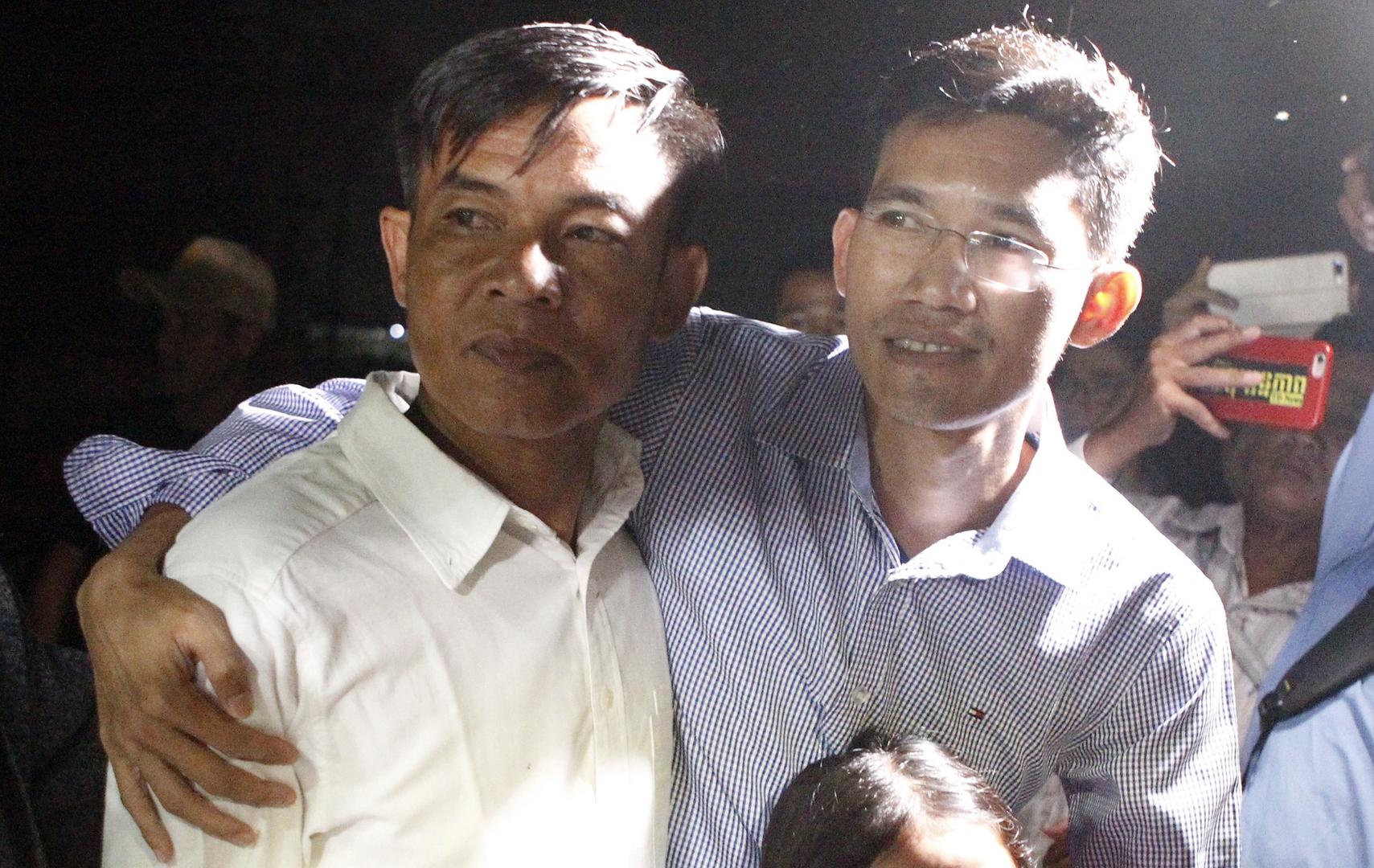Cambodia: Drop Radio Free Asia Case
Former Radio Free Asia reporters Uon Chhin and Yeang Sothearin outside Prey Sar prison in Phnom Penh, Cambodia, August 21, 2018.

(Bangkok) – Cambodian authorities should drop the politically motivated espionage charges against two former Radio Free Asia (RFA) journalists and quash the decision to put them under judicial supervision, Human Rights Watch said today. On March 15, 2019, the investigating judge of the Phnom Penh court ordered the case against Uon Chhin and Yeang Sothearin to go to trial on the basis of allegations that they “illegally collected information for a foreign source.” On June 21, the Phnom Penh appeals court will hear arguments challenging the decision to place them under judicial supervision. “The two former RFA journalists are victims of Prime Minister Hun Sen’s unending attack on media outlets that dare air critical reports about the government,” said Brad Adams, Asia director. “There’s no basis for the ludicrous charges against these two reporters or for forcing them into judicial supervision.
The court should drop both the charges and supervision arrangements immediately.” On November 14, 2017, Cambodian authorities arrested Sothearin, RFA’s former Phnom Penh bureau office manager and a news editor, and his colleague Chhin, a former cameraman. Four days later, the Phnom Penh Municipal Court charged both with supplying a foreign state with information prejudicial to Cambodia’s national defense under article 445 of the Criminal Code, an offense punishable by a prison term of 7 to 15 years. The two former RFA journalists are victims of Hun Sen’s unending attack on media outlets that dare air critical reports about the government. Brad Adams Asia Director Asia Director The men were held in pretrial detention for over nine months and were repeatedly refused bail until August 21, 2018, when the court agreed to release them and place them under judicial supervision. As a condition of their release, they must check in monthly at a local police station and cannot travel abroad.
The government arrested the men two months after the RFA shut down its Cambodia bureau and newsgathering operations. RFA alleged that systematic government harassment of its reporters compelled it to close the bureau.
The government accused Sothearin and Chhin of illegally setting up a broadcast studio with the purpose of continuing to file news reports to RFA’s headquarters in Washington, DC.
The reporters challenged the charges against them by appealing in September to the Supreme Court to drop the case.
The court rejected their appeal. RFA has a long history of reporting on corruption, social issues, illegal logging, and violations of land rights in Cambodia. In August 2017, the Cambodian authorities ordered the closure of 32 FM radio frequencies across 20 provinces, particularly stations that relayed independent Khmer language news broadcast by RFA, Voice of America, and Voice of Democracy. After the RFA office closed, senior officials from the Ministries of Interior and Information threatened any journalists found to still be filing media reports to RFA, saying that they would be treated as spies. In March 2018, prosecutors brought additional unfounded charges against Chhin and Sothearin that they produced pornography, in violation of the Law on the Suppression of Human Trafficking and Sexual Exploitation. If convicted of these additional charges, they face 16 years in prison. On May 29, 2019, the United Nations Working Group on Arbitrary Detention concluded that the “violations of the right to a fair trial are of such gravity as to give the deprivation of liberty of Mr. Uon and Mr. Yeang an arbitrary character.” The working group also observed that article 445 of the Cambodian Penal Code was not in line with Cambodia’s international human rights obligations as it did not offer a definition of what constitutes an offense under that provision, leaving broad and unfettered discretion to authorities, risking abuse. Ahead of the July 2018 elections, Prime Minister Hun Sen cracked down on independent and critical voices in Cambodia, targeting political opposition members and supporters, activists, human rights defenders, and journalists. Hun Sen has repeatedly threatened in recent months to enact a “fake news” law and a restrictive cybercrime law. Such new laws would add to the series of repressive laws and amendments passed in the last four years that severely restrict the right to freedom of expression.
The upsurge in the Cambodian government’s rights violations has led the European Union to consider rescinding Cambodia’s privileges under the EU’s Everything But Arms trade treaty. “The European Union should be mindful of the trial of Sothearin and Chhin when deciding whether to drop Cambodia from the Everything But Arms trade benefits,” Adams said. “The EU should call for this case to be dropped and all harassment of media outlets and their reporte.
Read the full article at the original website
References:
- /view-mode/modal/331359
- https://www.hrw.org/asia/cambodia
- https://www.rfa.org/english/news/cambodia/reporters-03152019133905.html
- https://www.phnompenhpost.com/national/hearing-set-rfa-reporters
- https://www.hrw.org/about/people/brad-adams
- https://www.hrw.org/news/2018/05/12/cambodia-release-ex-radio-free-asia-journalists
- https://www.rfa.org/english/news/cambodia/crackdown-raf-09122017084157.html
- https://www.phnompenhpost.com/national/case-against-rfa-reporters-pushes-ahead
- https://www.khmertimeskh.com/533877/supreme-court-rejects-rfa-pairs-complaint/
- http://www.licadho-cambodia.org/articles/20170909/148/index.html
- https://www.phnompenhpost.com/national/official-warns-ex-rfa-staffers-about-continuing-work-cambodia
- http://www.licadho-cambodia.org/flashnews.php?perm=241
- https://www.ohchr.org/Documents/Issues/Detention/Opinions/Session84/A_HRC_WGAD_2019_3.pdf
- https://www.hrw.org/news/2018/07/25/cambodia-july-29-elections-not-genuine-0
- https://www.khmertimeskh.com/50583926/pm-pushes-for-anti-fake-news-law/
